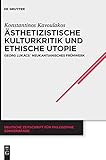Ästhetizistische Kulturkritik und ethische Utopie : Georg Lukács' neukantianisches Frühwerk / Konstantinos Kavoulakos.
Material type: TextSeries: Deutsche Zeitschrift für Philosophie / Sonderbände ; 37Publisher: Berlin ; Boston : De Gruyter (A), [2014]Copyright date: ©2014Description: 1 online resource (265 p.)Content type:
TextSeries: Deutsche Zeitschrift für Philosophie / Sonderbände ; 37Publisher: Berlin ; Boston : De Gruyter (A), [2014]Copyright date: ©2014Description: 1 online resource (265 p.)Content type: - 9783050064468
- 9783110380040
- 9783110364217
- 320.01
- B4815.L84 K38 2014
- B4815.L84
- online - DeGruyter
- Issued also in print.
| Item type | Current library | Call number | URL | Status | Notes | Barcode | |
|---|---|---|---|---|---|---|---|
 eBook
eBook
|
Biblioteca "Angelicum" Pont. Univ. S.Tommaso d'Aquino Nuvola online | online - DeGruyter (Browse shelf(Opens below)) | Online access | Not for loan (Accesso limitato) | Accesso per gli utenti autorizzati / Access for authorized users | (dgr)9783110364217 |
Frontmatter -- Inhalt -- Vorwort -- Siglenverzeichnis -- 1. Einleitung: Ästhetizismus und ethische Utopie -- 2. Philosophische Fundamente der neukantianischen Ästhetik Lukács’ -- 3. Der „Kerker der eigenen Individualität“ und die Tragödie der Kunst -- 4. Kunst und Geschichte -- 5. Eine geschichtsphilosophische Typologie der Epik -- 6. Dostojewski und die Utopie der Seelenwirklichkeit -- 7. Erlebniswirklichkeit, Kunst und Kultur -- 8. Epilog: Unterwegs zu einer neuen Synthese -- Literaturverzeichnis -- Personenregister
restricted access online access with authorization star
http://purl.org/coar/access_right/c_16ec
Die Studie greift die philosophische Frage nach den Grenzen und der möglichen Überwindung des Formalismus auf. Sie bietet eine kritische Rekonstruktion des Frühwerks von Georg Lukács, in dem eine eigenartig ästhetizistische Kulturkritik mit einer ethischen Utopie dostojewskischer Prägung ergänzt werden sollte. Das Aufzeigen der Einheit wie der Aporien dieses zweigleisigen Ansatzes wirft neues Licht auf Lukács’ marxistische Wende Ende 1918.
This study examines philosophical questions regarding the limitations of formalism and how they might be overcome. It presents a critical reconstruction of the early work of Georg Lukács, which attempted to supplement a unique form of aesthetic cultural critique with a Dostoyevskian-styled ethical utopia. Demonstrating the unity and the aporias of this two-track approach, it sheds new light on Lukács’s Marxist turn at the end of 1918.
Issued also in print.
Mode of access: Internet via World Wide Web.
In German.
Description based on online resource; title from PDF title page (publisher's Web site, viewed 28. Feb 2023)


